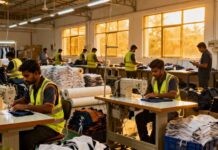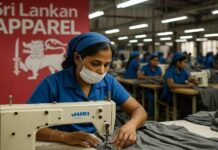As the world grapples with the environmental impact of the textile sector, India, the third-largest contributor to global textile waste, is under increasing pressure to adopt sustainable practices. In response, both textile retailers and manufacturers are exploring innovative strategies to reduce their ecological footprint.
Millennials and Gen Z consumers, who view fashion as a lifestyle choice, are driving this change. Their desire for the latest trends has led to a rapid pace of production, but this comes at a significant environmental cost. According to a McKinsey report, global clothing consumption is projected to reach 102 million tonnes by 2030, largely fueled by fast fashion. Sayooj Thekkevariath, a partner at EY India, highlights how the demand for inexpensive, trendy clothing fosters a manufacturing model that can harm both the environment and society.
The ramifications of this fast-paced production are stark. The documentary The True Cost sheds light on the environmental degradation caused by the mass production of affordable garments, including water pollution and reliance on toxic chemicals in manufacturing countries like India and Bangladesh. A UNDP report indicates that the global textile industry generates 92 million tonnes of waste annually, with the garment lifespan reducing by 36% from 2000 to 2015. Alarmingly, 17% of textile waste finds its way into landfills, while the industry accounts for 8-10% of total greenhouse gas emissions.
India stands out as the sixth-largest textile exporter, contributing 2.3% to the national GDP. However, it also accumulates approximately 7.8 million tonnes of textile waste each year, representing 8.5% of global textile waste. The rise in popularity of man-made fibres, such as polyester and acrylic, reflects changing fashion preferences, but this trend raises concerns over microplastic pollution and Scope 3 emissions, as emphasized by Thekkevariath.
In response to these challenges, the Indian government has launched the National Technical Textiles Mission, with a budget of ₹1,480 crores, aimed at promoting technical textiles across key sectors. The initiative encourages sustainable practices through incentives like rebates for renewable energy and low-carbon technologies. Companies are beginning to prioritize environmental, social, and governance (ESG) practices.
For instance, Raymond Ltd has made strides by introducing dope-dyed wool to replace traditional polyester, reducing dye usage and energy consumption while achieving a 1.84% reduction in Scope 1 emissions in FY24. Reliance Retail is also committed to sustainability as it develops eco-friendly polyester technologies.
Fashion retailer Trent, which operates brands like Zudio and Westside, is focusing on sustainability by assessing the product life cycle, materials used, and consumer safety. It has partnered with WiseBin for plastic waste recycling initiatives. Additionally, Aditya Birla Fashion and Retail (ABFRL) is enhancing its ‘ReEarth Vision’ to advance sustainable sourcing and enhance product lifecycle management.
Technological advancements are playing a crucial role in these sustainability efforts. ABFRL is utilizing artificial intelligence to streamline inventory management, mitigate overproduction, and promote responsible sourcing, while blockchain technology helps ensure transparency throughout the supply chain.
Emerging brands are also making significant contributions. For instance, Hyderabad-based Nicobar uses certified organic cotton, recycled polyester, and sustainable fabrics like TENCEL and bamboo, while Delhi-based Doodlage repurposes plastic bottles into fashion wear.
Despite these initiatives, consumer behavior remains a hurdle. A 2023 Bain & Company report reveals that while over 65% of urban consumers express concern about climate change, only 13% consider sustainability in their fashion purchases. To bridge this gap, strategies like storytelling via QR-coded labels that demonstrate environmental impacts could enhance awareness.
Globally, countries like Sweden and France are leading the charge toward circular fashion, with the EU’s Green Deal mandating separate textile waste collection systems by 2025. Meanwhile, neighboring countries like Bangladesh and Vietnam are advancing sustainability through factory-level certifications.
As India strives to reduce its carbon footprint, the textile industry has the potential to lead the way in sustainable practices. However, realizing this ambition will require more than just dialogue; concerted action is essential to create lasting change in the industry.

































